Page last updated: September 21, 2019
All pages copyright © 2019 by Pinyon Publishing

SCANT HOURS
Selected Poems of Elisabeth Schmeidel
Translated by Stuart Friebert
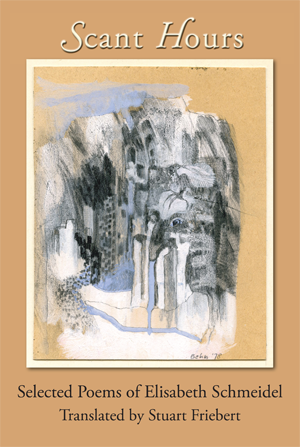
From the Introduction by Thomas Wild:
Scant Hours guides us through Schmeidel’s poetic worlds. The Early world is marked by war, by violence, by fear, by ‘submarine mines,’ and a ‘many-thousand-year Reich.’ … We see the urgent tasks: to look closely, to weigh words, soft and sharp, to take off one’s armor and allow the skin to sense the individual’s relationship to time: ‘On one day/ […] the sun, rising, / will break through / the skin of the earth and / […] as usual / you’ll / do everything normally / while the ground / under your feet / burns’ (‘Instructions’).
The lyric voice in Later becomes increasingly inward ... the relationship to the self, love, family, sickness, inner life. In ‘We Exist’: ‘I want to be there again where / there are questions in people’s eyes. […] // I want to be there again / where the sky touches the horizon / and we go freely next to one another: / silhouettes of our finiteness.’ These lines express that we exist not alone, but in plural form. They offer a perspective in which ‘finiteness’ can be identified as a sign of our vitality and freedom.
Later Still marks the third section of poems. ... Long poems and short ones, brief and extended lines, clear stanzas and loosely grouped lines, associative suggestions and narrative sentences. As if something was ending, running out, some would say; I would say rather: as if something were beginning again. ‘Possible’ ends the volume, testing out possible constellations of ‘yourself,’ and ‘death,’ and ‘laugh,’ ending with ‘died out,’ which is bookended by ‘laughed at,’ and ‘kept laughing.’
With incomparable sensitivity and linguistic creativity, Stuart Friebert succeeds not only in bringing Elisabeth Schmeidel’s marvelous images and surprising word collages into English; rather, his American English creates a tone that allows the contemporary English-speaking world access to the fine overtones, the voices and moods of Schmeidel’s language.
From Remembering Her by Stuart Friebert:
Many of the poems sail into the dangerous waters of illness, anger, and despair. We had many a conversation about the eroding political landscape of her beloved Austria. She’d order another ‘langen braunen’ (her go-to Austrian pick-me-up), light another cigarette I’d smuggle her in some quantities, and start sketching and scribbling away on café tablecloths …
Praise for Scant Hours:
“Scant is the perfect tag—these poems are brief but intense, urgent. I love Schmeidel’s staccato delivery—the way her poems just start, the way they never apologize. Her poems assume that the reader is a grown-up. The broken list (the format of poems like ‘What They Say to the Child’ and ‘Excuse Me’) is infectious in its drive. Schmeidel’s vision often seems dark, but it is a quality of light ‘… beset by / the grip of matter.’”
—Dennis Schmitz, Author of Animism (Oberlin College Press)
“Too terrified in life to give voice to her own, often contradictory, insights and impulses, Schmeidel’s telling metaphor for herself is the tarnished cork bottle (‘Scant Hours / Moments of Weakness’) carried on the tides from one continent to another, found, derided, cast back into the sea, its message never revealed. What does Friebert’s uncorked bottle reveal?
“First, an exquisite sensibility rendered in affecting images of nature, of human faces and voices. Schmeidel is acutely aware of the encroaching darkness: the eventual demise of the planet, political tyranny, men’s objectification of women, our murderous insensitivity to children. She looks for solace in certainty. But what is real? Does intimacy exist or is it an illusion? Is nothing happening or is everything happening? Does her inner clown know something important or is laughter a distraction as we die? Should she speak out or will she be deemed demented? (‘Whatever’s the matter with you,’ says her mother.)
“Is transformative action even possible?
“Friebert has brought this extraordinary artist, thinker, and activist out of her own shadows and allowed her to stand up and be encountered.”
—Lois Meredith, Psychotherapist and Playwright
“In this noisy, tweet-lashed, rumor-riddled world of ours, what a tonic reprieve it is to encounter the keen-eyed distillations of Elisabeth Schmeidel. Scant hours, dear fellow reader, both yours and mine, and far too precious to lose to the busy oblivions that fill our days. Schmeidel writes to the bone, and Stuart Friebert captures both her urgency and elegance with a mastery so consummate as to seem (oh masterful deception!) almost transparent.”
—Linda Gregerson
 ELISABETH SCHMEIDEL (1945-2012), born in Austria, taught art in secondary schools and wrote seriously and furiously “on the side.” Shy about publishing, she did allow Stuart Friebert to translate at will.
ELISABETH SCHMEIDEL (1945-2012), born in Austria, taught art in secondary schools and wrote seriously and furiously “on the side.” Shy about publishing, she did allow Stuart Friebert to translate at will.
The original German version of Scant Hours (Stirngewächse herzverwurzelt, edited by Elisabeth’s daughter Pia Grubbauer) was published by scaneg Verlag/Munich.
 STUART FRIEBERT taught German at Oberlin College, where he founded the Creative Writing Program with help from colleagues, and co-founded Field Magazine, the Field Translation Series, and Oberlin College Press. He has published 15 books of poems (including Floating Heart—the 2015 Ohioana Poetry Award winner and Decanting, Selected and New Poems), 14 volumes of translations, anthologies, and prose (recently First and Last Words).
STUART FRIEBERT taught German at Oberlin College, where he founded the Creative Writing Program with help from colleagues, and co-founded Field Magazine, the Field Translation Series, and Oberlin College Press. He has published 15 books of poems (including Floating Heart—the 2015 Ohioana Poetry Award winner and Decanting, Selected and New Poems), 14 volumes of translations, anthologies, and prose (recently First and Last Words).
October, 2017—Solstice Interview:
Stuart Friebert discusses translating the poetry of Austrian, Elisabeth Schmeidel (1945-2012). Read the Interview
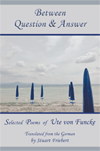 Between Question & Answer (2018)
Between Question & Answer (2018)
Selected Poems of Ute von Funcke, Translated by Stuart Friebert
6"x9" paperback
152 pages
978-1-936671-52-6
$18.00
ALSO AUTHORED OR TRANSLATED BY STUART FRIEBERT

April 13, 2018—A Word’s Worth Review:
“Stuart Friebert has gifted readers with the translation of a visionary poet who was not afraid to write of days when "nothing is going on" or to pass on the urgent message that we must pay attention to the destruction of nature, political tyrannies, fears and hopes for humanity, and she suggests the “way in” can be through the language of the poet.” Read the Review
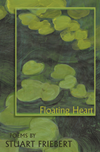 Floating Heart
Floating Heart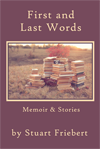 First and Last Words
First and Last Words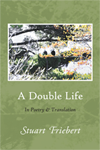 A Double Life
A Double Life